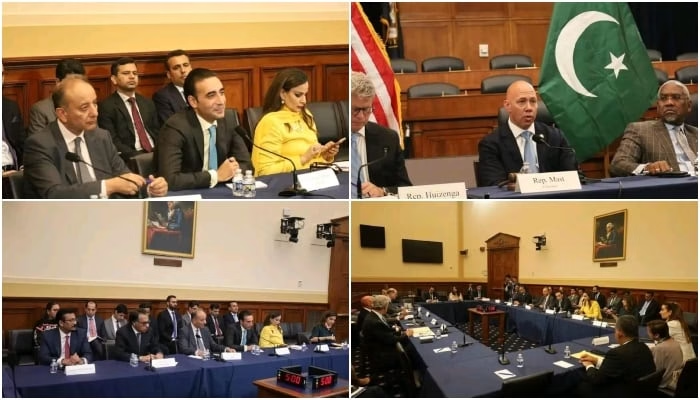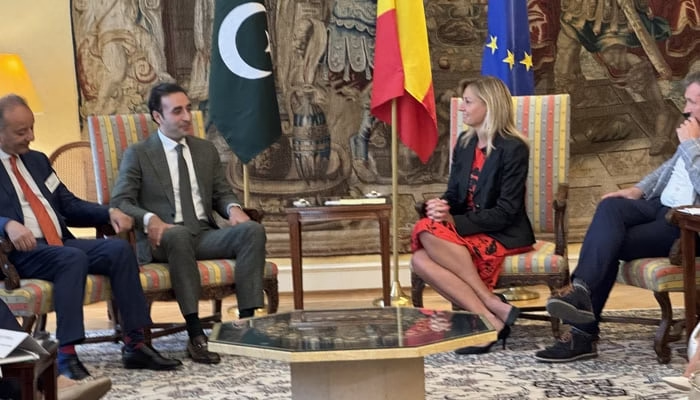In a critical diplomatic engagement aimed at promoting regional peace and stability, Chairman of the Pakistan People’s Party and Head of the Pakistani Diplomatic Committee, Bilawal Bhutto Zardari, delivered a stark message during his official visit to the United States. Leading a high-level Pakistani delegation, Bilawal held meetings with multiple U.S. Congress members, drawing attention to growing regional tensions between Pakistan and India, and urging Washington to play a proactive role in preventing further escalation.
During these meetings, Bilawal Bhutto Zardari emphasized that any act of terrorism in India—regardless of evidence—is being used as a pretext for potential military confrontation, raising the specter of a full-scale war between two nuclear-armed neighbors.
War Threshold Has Never Been This Low
Speaking with American lawmakers including Jack Bergman, Tom Suozzi, Ryan Zinke, Maxine Waters, Al Green, Jonathan Jackson, Hank Johnson, Stacey Plaskett, Henry Cuellar, and others, Bilawal issued a chilling warning. He stated:
The threshold of full-scale war between India and Pakistan has never been so low in our history. Any act of terrorism occurring in India, even without evidence of Pakistani involvement, is viewed as a call for war.
He noted that the current environment in South Asia is alarmingly unstable, and that peace initiatives must go beyond just maintaining a ceasefire. True peace, Bilawal said, will only be possible if both nations prioritize diplomacy over aggression.
Shehbaz Sharif’s Peace Mission
Bilawal highlighted that the Pakistani Prime Minister Shehbaz Sharif had tasked the delegation with a peace mission, centered on promoting dialogue and diplomatic resolution of bilateral conflicts with India. He stressed the need for constructive American involvement in discouraging India from pursuing dangerous unilateral decisions.
India’s Water Threat: A Declaration of War?
In one of the most alarming segments of his dialogue with U.S. officials, Bilawal Bhutto drew attention to India’s threats of suspending the Indus Waters Treaty, a decades-old agreement that governs water sharing between the two countries. Bilawal described this move as an existential threat to over 240 million Pakistanis, equating it to a declaration of war.
The Indus Waters Treaty is not just a document—it is a lifeline. India’s signal to cut off water to Pakistan is a threat not just to our country, but to peace in the region, he asserted.
He warned that using water as a geopolitical weapon sets a dangerous international precedent and urged the United States to help prevent such actions before the consequences become irreversible.
Kashmir and Human Rights Violations
The Pakistani delegation also raised the long-standing Kashmir conflict, reiterating Pakistan’s demand for the right to self-determination for Kashmiris, as outlined in the United Nations resolutions. Bilawal expressed grave concern about the deteriorating human rights situation in Indian-occupied Kashmir, calling for international attention and action.
He added that India’s continued military aggression and suppression of civil liberties in Kashmir not only violates human rights but also fuels further instability in an already volatile region.
U.S. Congress Members Assure Support
In response to Bilawal’s detailed briefing, members of the U.S. Congress assured the Pakistani delegation of their commitment to supporting peace and stability in South Asia. The American lawmakers acknowledged the gravity of the issues raised and appreciated Pakistan’s initiative to address them through dialogue and international engagement.
The delegation also met separately with members of the House Foreign Affairs Committee, where discussions expanded to cover broader aspects of U.S.-Pakistan relations, the evolving geopolitical landscape of South Asia, and ways to foster mutual cooperation in counter-terrorism, trade, and diplomacy.
Bilawal’s Closing Message: Peace Through Partnership
Concluding his visit, Bilawal Bhutto Zardari reaffirmed Pakistan’s commitment to peace, calling on the United States to act as a global leader in preventing conflict and encouraging dialogue between South Asian nations.
If America lends its voice and influence in support of peace, it can help convince India to pursue a path of diplomacy instead of hostility,Bilawal said.
His statement marks a significant moment in Pakistan’s foreign policy outreach, emphasizing that peace is not only possible, but essential—for South Asia and the wider world.



